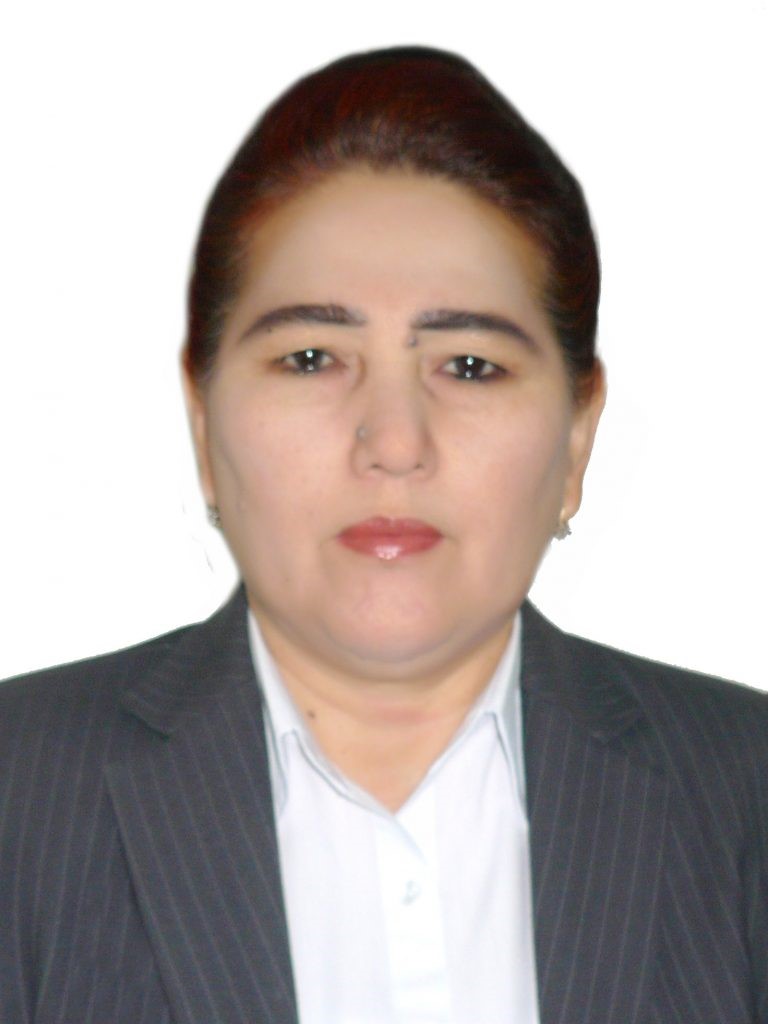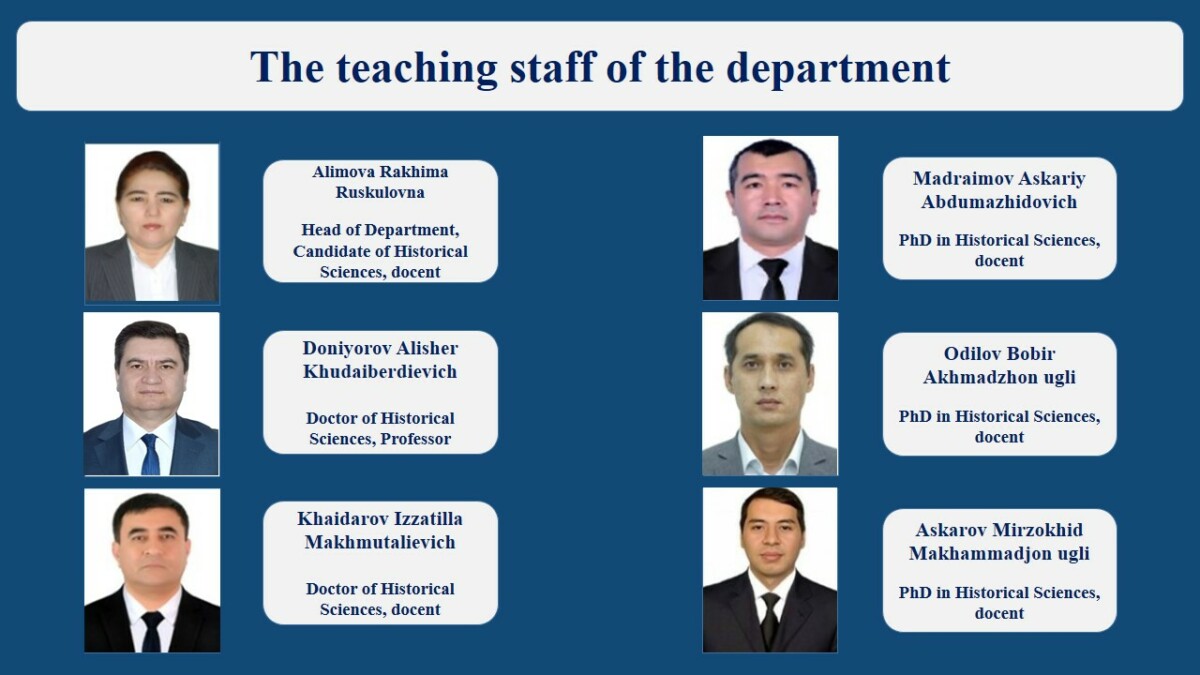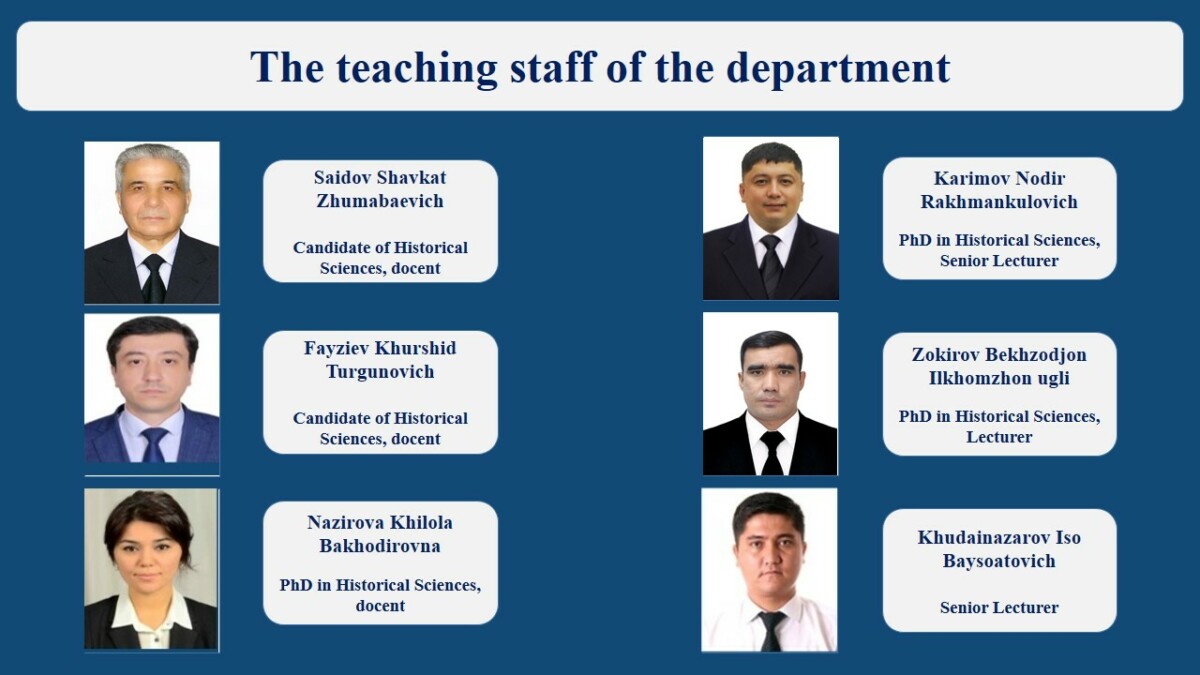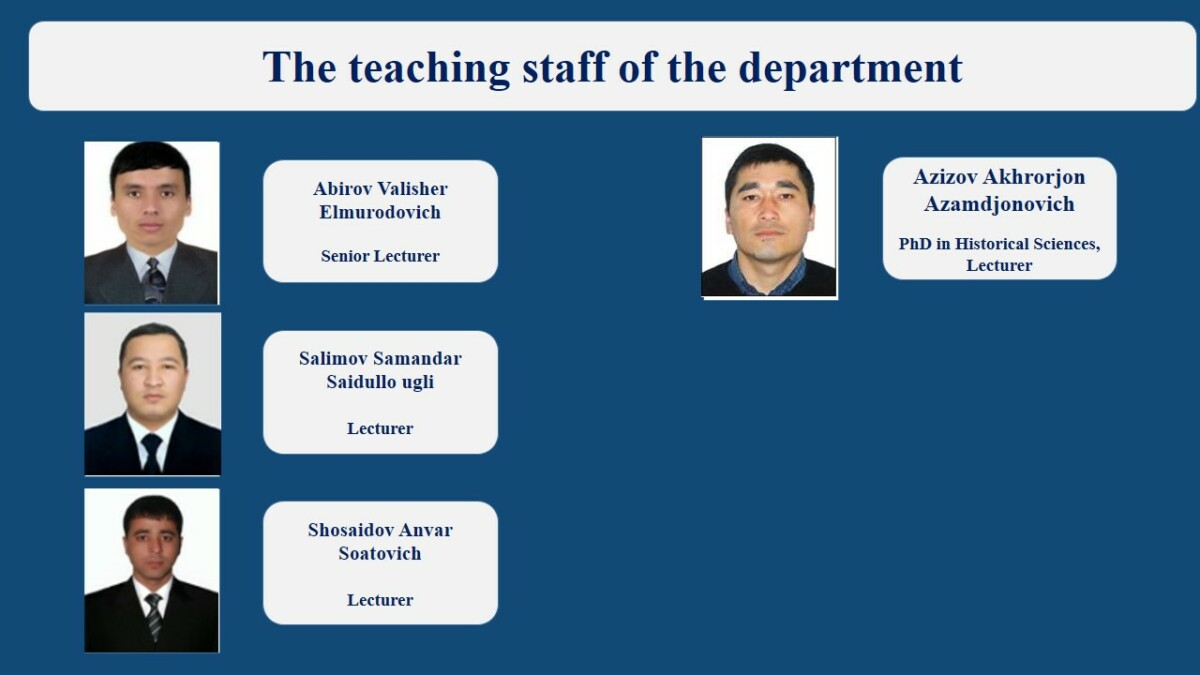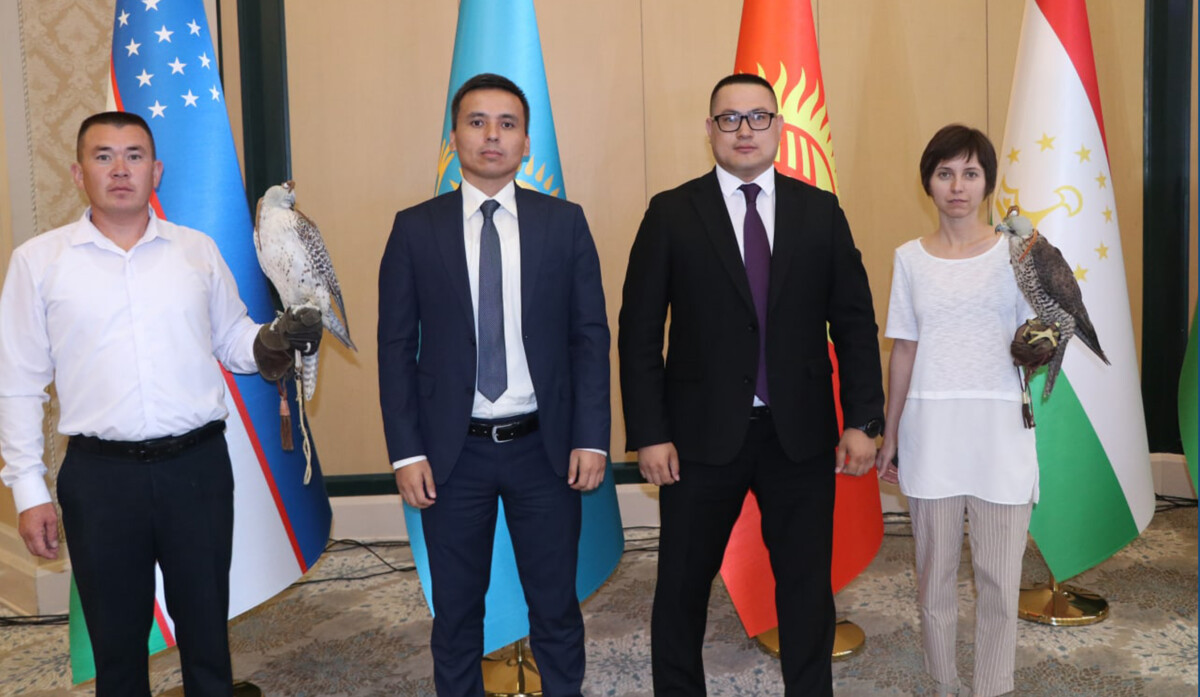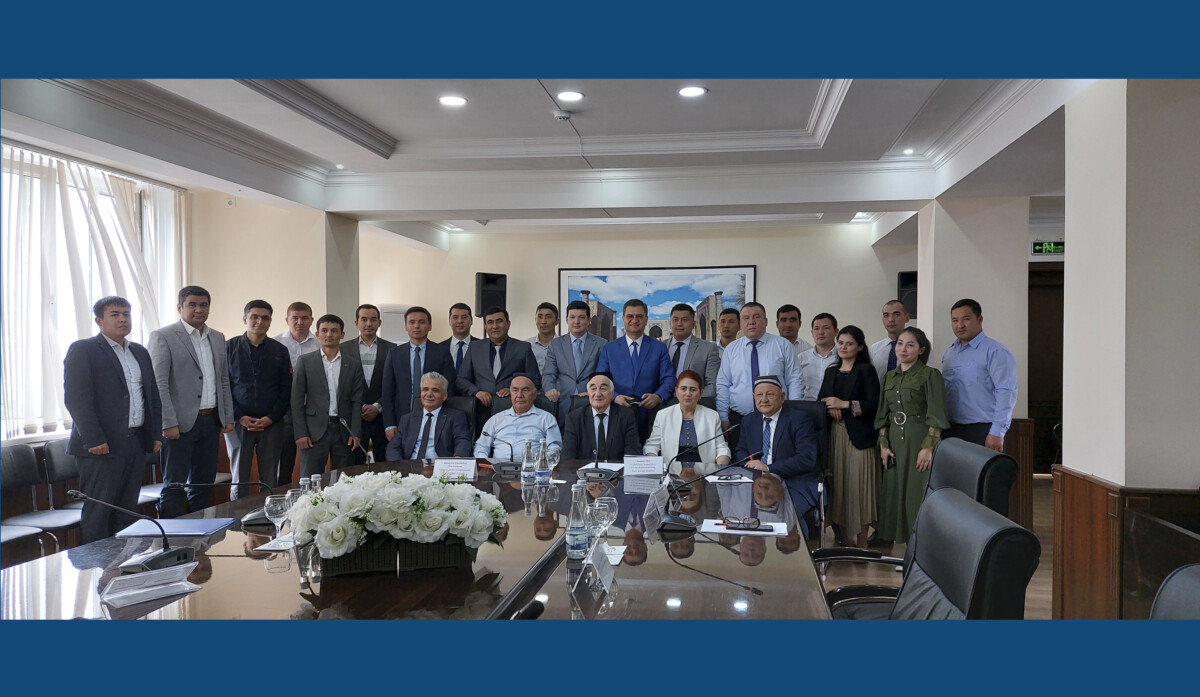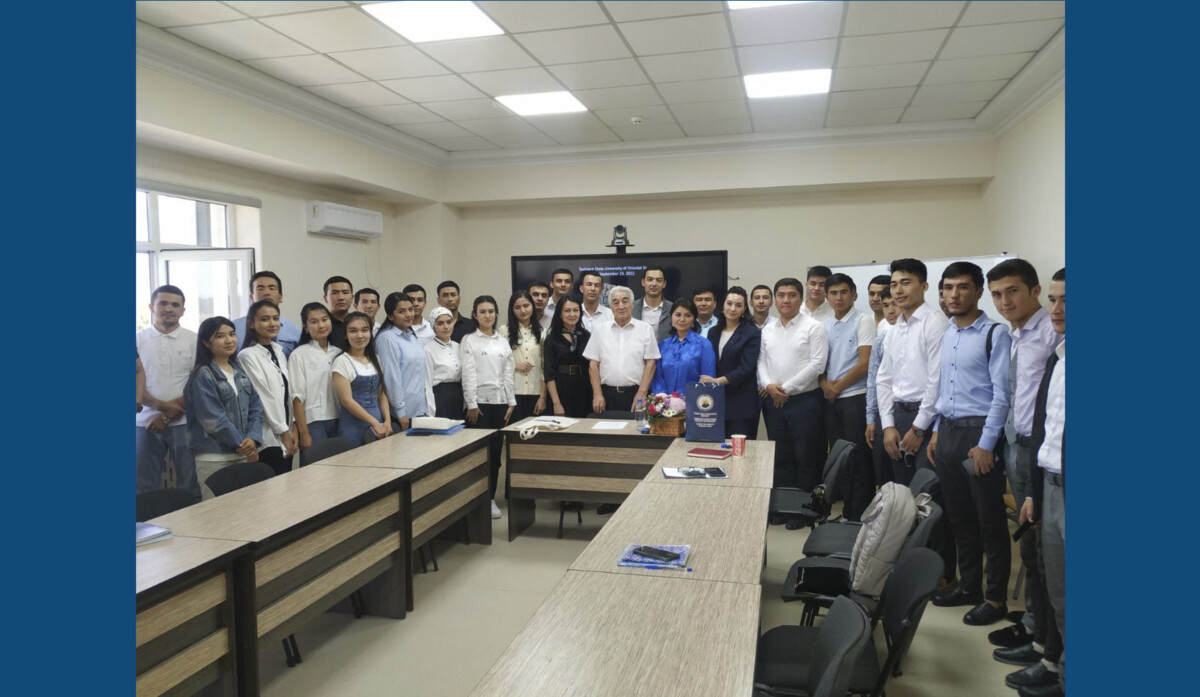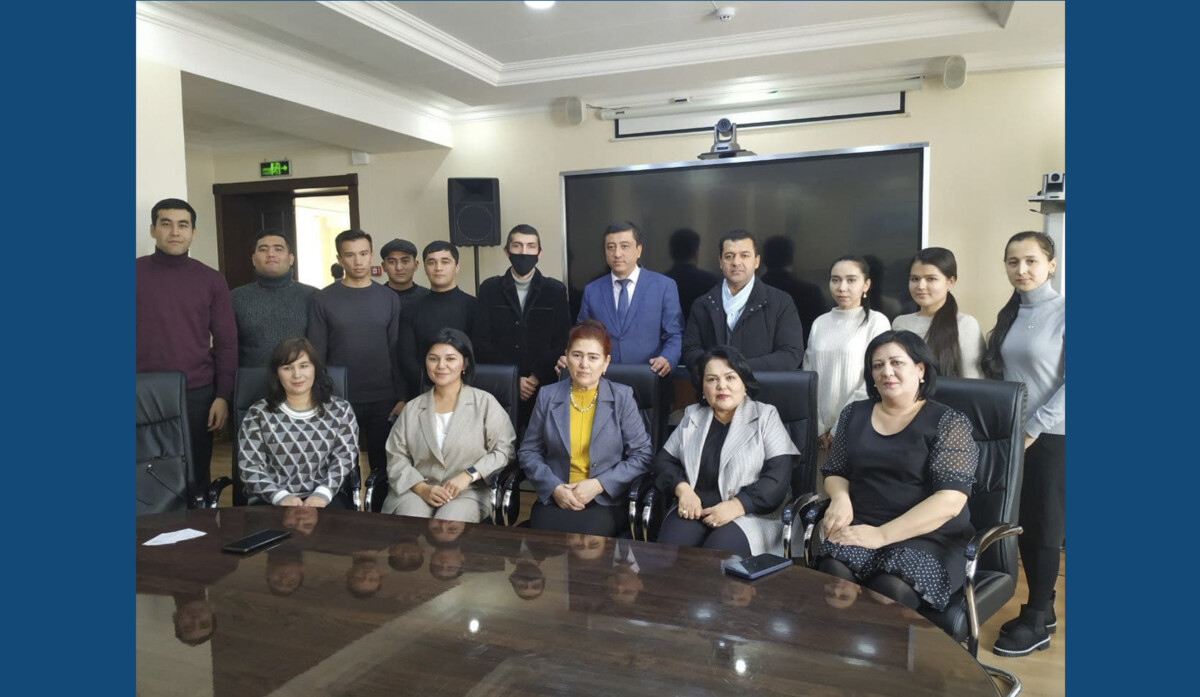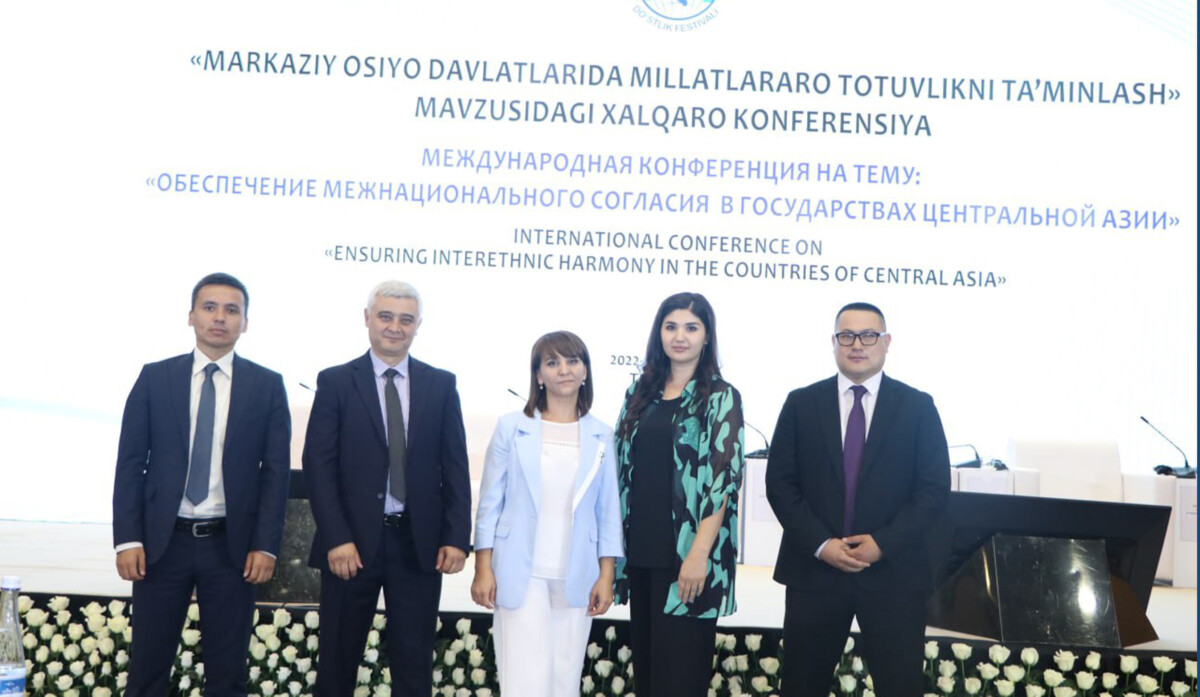Department of History and Source Studies of the Peoples of Central Asia
History of the Department
In 1991, with the establishment of the Tashkent State Institute of Oriental Studies, the Department of History of the Peoples of Central Asia was established. The department was renamed the Department of History and Source Studies of the Peoples of Central Asia in 2017, and the Department of History and Ethnology of the Peoples of Central Asia in 2020. Professors and teachers of the department in accordance with the State Educational Standards of Continuing Education of Uzbekistan (by State Education Standard of Higher Education) in the direction of Bachelorius “5220200 – History (by countries and regions)” and 5220200 (Now -60220300) – History (by countries of Central Asia) and after in the directions based on the general requirements for the content of the required knowledge and the level of training of masters in the field of 5A220204 (Now 70220303 – Methods of Historiography, Source Studies and Historical Research (by countries of Central Asia) and from begining of 2020-2021 academic year 5A121401 – (Now – 70230501) – Ethnography, ethnology and anthropology on the basis of undergraduate education the general history of the peoples of Central Asia and the region, the history of statehood, historical geography, historical sources and historiography, systems of religious worldview, stages of socio-political development, material and teaching subjects on spiritual culture, ethno-social and ethno-cultural relations are taught. The department also has a master’s degree in history, source studies and the problems of methods and methodology of historical research. 70230501 – Master’s degree in Ethnography, Ethnology and Anthropology provides training in ethnology, social anthropology, anthropological and ethnological research methods, historical and modern ethnocultural processes. In the 2022-2023 academic year, the 60230500 – Anthropology and Ethnology educational course was opened and students were admitted to it for the 1st year. During the past years, the department was managed by the following specialists:
Over the years, the department has been headed by the following specialists:
G.Ahmadjonov. Doctor of Historical Sciences, Professor. 1991-1998
M.M.Is’hokov. Doctor of Historical Sciences, Professor. 1998-2012
Sh.Saidov. Candidate of Historical Sciences 2012-2013.
X.T.Fayziev. Candidate of Historical Sciences. 2013-2014.
R.R.Alimova. Candidate of Historical Sciences. 2014-2015.
I.M.Haydarov. Candidate of Historical Sciences. 2015-2017.
Currently R.R. Alimova is a head of the department. Candidate of Historical Sciences. From 2017.
Until 1998, teaching the subject “History of Uzbekistan” was a leading activity of the department. From 1998 to 2019, the teaching of the historical and geographical region of Central Asia was established, the sciences were improved. In particular, the teaching of the history of East Turkestan, Tibet, Altai-Zhetisu, Dashti Kipchak was introduced.
The Department of History and Ethnology of the Peoples of Central Asia is the only one in Central Asia in terms of goals and objectives. Students will specialize in historical source studies and historiography based on knowledge of major Eastern languages and one of the Western languages.
The department offers the following undergraduate programs.
- 60220300 – History (Eastern Countries and Regions (by countries of Central Asia)
- 60230500 – Anthropology and ethnology undergraduate education
The department teaches students of the following master’s specialties.
- 70220303 – Methods of Historiography, Source Studies and Historical Research (by countries of Central Asia)
- 70230501 – Ethnography, ethnology and anthropology
The department offers the following subjects for undergraduate and graduate students.
Bachelor’s degree:
- Modern history of Uzbekistan
- Archival science
- History of the region under study (history of the peoples of Central Asia)
- Ethnology of the peoples of Central Asia
- Source study and historiography of the peoples of Central Asia
- Introduction to oriental studies
- Modern methods of teaching historical science
- Historical geography of Central Asia (elective subject)
- Auxiliary historical disciplines (elective subject)
- Fundamentals of scientific research (elective subject)
- Interactive methods of teaching history (INCA)
- Central Asia and world civilization (elective subject)
- History of diplomacy of Central Asia (elective subject)
- History of diplomacy of the East and Central Asia (INCA)
- Issues of Uzbek ethnology in the works of the Jadids
- Statehood and urbanization processes in Central Asia
- History of Central Asian culture (elective subject) choice)
- History of socio-political doctrines of Central Asia (elective subject)
- The Great Silk Road: history and modernity (elective subject)
- Modern relations of the Central Asian states: integration processes and prospects
- Economic and cultural ties of the Central Asian countries in the modern period
60230500 – Bachelor’s degree in Anthropology and Ethnology
- Modern history of Uzbekistan
- Evolution and prehistory of man
- Ethnodemography
- Ethnological museology
- Ethnosociology
- Ethnology of Uzbeks and its historiography.
- Historical anthropology
- History of statehood of Uzbekistan.
- Ethnological research methods.
- World ethnology
- Auxiliary historical subjects (elective subject)
- Ancient states of Central Asia (elective subject)
- Transformation processes in Central Asia within the Arab Caliphate (elective subject)
- Anthropology of religion (elective subject)
- Ethnology of Central Asia.
- Visual anthropology
- Ethnic conflictology
Master’s degree:
70220303 – Methods of Historiography, Source Studies and Historical Research (by countries of Central Asia)
- Methodology of scientific research
- Theoretical issues of specialization
- Philosophy of history
- Theoretical issues of historiography and source studies.
- Concepts of Modern Historiography of Central Asia (elective)
- Central Asia in Western Historiography (elective)
- Historiography of the Jadids (elective)
- Historical Diplomacy (elective)
- Genesis and Development of Nomadic Culture in Central Asia (elective)
- International Relations of Central Asian Countries in the Late Middle Ages (elective)
- Solving the Problems of Medieval Turkish Historiography (selection topic)
- Historiography of the Timurid Period (elective)
- Geopolitics in Central Asia in the Modern Era (elective)
- Social Anthropology of the Peoples of Central Asia (elective)
- Historiography of the Timurid Period (elective)
- Historiography of Ethnocultural Processes in Central Asia in the Middle Ages (elective)
70230501 – Ethnography, ethnology and anthropology
- Methodology of scientific research
- Theoretical issues of specialization
- Theoretical issues of ethnology and anthropology.
- Ethnological and anthropological research methods.
- Historiography of the ethnology of Uzbekistan (elective subject)
- Historiography of the ethnology of the peoples of Central Asia (elective subject)
- Ethnotoponymy of Central Asia (elective subject)
- Ethnogeography of Central Asia (elective subject)
- Identity of the peoples of Central Asia: traditional and modern views (elective subject)
- Culture, traditions and religious beliefs of the peoples of Central Asia (elective subject)
- Historiography of the economy of the peoples of Central Asia (elective subject).
- Historiography of the problems of the economy of the peoples of the East (elective subject).
- Socio-political processes in the Turkic world in ancient times and the Middle Ages (elective subject)
- Visual anthropology of the peoples of the East (elective subject)
Scientific projects of the department
- “History of the Peoples of Central Asia”
- “Ethnography, ethnogenesis and ethnic history of the peoples of Central Asia”
- “Historical research methods”
The scientific direction of the department
- History, historiography, source studies and methods of historical research of the peoples of Central Asia
- Historiography of ethnology of Uzbekistan
- Historiography of political, economic and cultural relations of the Central Asian khanates with the countries of the East
- The role of Uzbek industry in the single national economic complex of the Soviet Union (1945-1991)
Scientific research center of the department
- “Scientific Center for History, Source Studies and Historical Geographical Research of the Peoples of Central Asia”
Partner organizations of the department
- State Museum of Repression Victims under the Cabinet of Ministers of the Republic of Uzbekistan
- Institute of Oriental Studies named after Abu Rayhan Beruni of the Academy of Sciences of the Republic of Uzbekistan
- Institute of History of the Academy of Sciences of the Republic of Uzbekistan
- O‘zR FA San’atshunoslik instituti
- State Museum of the History of the Temurids of the Academy of Sciences of the Republic of Uzbekistan
- State Museum of History of Uzbekistan of the Academy of Sciences of the Republic of Uzbekistan
- National Archive of Uzbekistan
- Tashkent State University of Oriental Studies Yunusabad Academic Lyceum.
Photo reports on the activities of the department
